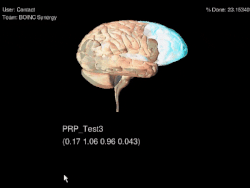 interactive screensaver | |
| Initial release | March 17, 2007 |
|---|---|
| Development status | Inactive |
| Operating system | Cross-platform |
| Platform | BOINC |
| Average performance | 0 GFLOPS, [1] |
| Active users | 0 |
| Total users | 0 |
| Active hosts | 0 |
| Total hosts | 0 |
| Website |
mindmodeling |
MindModeling@Home [2] is an inactive non-profit, volunteer computing research project for the advancement of cognitive science. MindModeling@Home is hosted by Wright State University and the University of Dayton in Dayton, Ohio.
In BOINC, it is in the area of Cognitive Science and category called Cognitive science and artificial intelligence. [3] It can only operate on a 64-bit operating system, preferably on a computer with multiple cores, running a Microsoft Windows, Mac OS X, or Linux operating system. This project is not compatible with mobile devices, unlike other projects on BOINC.
Research focus
- N-2 Repetition: understanding how people have a harder time returning to a task from another one
- Observing how people read through their eye movement for the purpose of helping people reduce eye strain and processing what they read better and faster.
- Modeling decision-making: resolving around decisions made from visual processing (focus and filtering)
- Integrated Learning Models (ILM) to create algorithms based on how people learn and make decisions
- How the brain performs tasks sequentially and simultaneously by measuring its blood flow [4]
Problems
- Its status is inactive. [5] However, it is "not down or closed," [6] as its servers are still running. [7]
- The projects are long; prolonged amounts of computing time can overheat a computer. The solution is to stop work on the project until the computer cools down. [8]
- It is subject to power outages, as seen on October 7, 2018 [9]
- When the website will be out of beta mode is unknown, as it has been in beta since 2007 [10]
Scientific results
- Godwin H.J., Walenchok S. et al. Faster than the speed of rejection: Object identification processes during visual search for multiple targets. J Exp Psychol Hum Percept Perform. 41-4, (2016). [11]
- Moore L. R., Gunzelmann G. An interpolation approach for fitting computationally intensive models. Cognitive Systems Research 19, (2014). [12]
- Moore L.R. Cognitive model exploration and optimization: a new challenge for computational science. Comput Math Organ Theory 17, 296–313. (2011). [13]
- Moore L.R., Kopala M., Mielke T. et al. Simultaneous performance exploration and optimized search with volunteer computing. 19th ACM International Symposium on High Performance Distributed Computing, (2010). [14]
- Harris J., Gluck K.A., Moore L.R. MindModeling@Home. . . and Anywhere Else You Have Idle Processors. 9th International Conference on Cognitive Modelling, (2009). [15]
- Gluck K., Scheutz M. Combinatorics meets processing power: Large-scale computational resources for BRIMS. 16th Conference on Behavior Representation in Modeling and Simulation, BRIMS. 1. 73-83. (2007). [16]
See also
References
- ^ de Zutter W. "MindModeling@Home: Credit overview". boincstats.com. Archived from the original on 2022-03-01. Retrieved 2023-06-18.
- ^ Moore, L. Richard; Kopala, Matthew; Mielke, Thomas; Krusmark, Michael; Gluck, Kevin A. (2010-06-21). "Simultaneous performance exploration and optimized search with volunteer computing". Proceedings of the 19th ACM International Symposium on High Performance Distributed Computing. HPDC '10. New York, NY, USA: Association for Computing Machinery. pp. 312–315. doi: 10.1145/1851476.1851518. ISBN 978-1-60558-942-8. S2CID 18679055. Archived from the original on 2022-09-05. Retrieved 2022-08-14.
- ^ "Choosing BOINC projects". boinc.berkeley.edu. Archived from the original on 2018-01-03. Retrieved 2019-07-13.
- ^ "Projects Overview". mindmodeling.org. Archived from the original on 2019-07-12. Retrieved 2019-07-13.
- ^ "MindModeling@Home - BOINC". boinc.berkeley.edu. Archived from the original on 2019-03-06. Retrieved 2019-07-13.
- ^ "Hails and Farewells". mindmodeling.org. Archived from the original on 2018-08-17. Retrieved 2019-07-13.
- ^ "Project status". mindmodeling.org. Archived from the original on 2019-07-13. Retrieved 2019-07-13.
- ^ "Read our rules and policies". mindmodeling.org. Archived from the original on 2019-07-13. Retrieved 2019-07-13.
- ^ "MindModeling@Home (Beta)". mindmodeling.org. Archived from the original on 2019-07-13. Retrieved 2019-07-13.
- ^ "When will mindmodeling@home be out of beta". mindmodeling.org. Archived from the original on 2018-08-27. Retrieved 2019-07-13.
- ^ Godwin, Hayward J.; Walenchok, Stephen C.; Houpt, Joseph W.; Hout, Michael C.; Goldinger, Stephen D. (August 2015). "Faster than the speed of rejection: Object identification processes during visual search for multiple targets". Journal of Experimental Psychology: Human Perception and Performance. 41 (4): 1007–1020. doi: 10.1037/xhp0000036. ISSN 1939-1277. PMC 4516661. PMID 25938253.
- ^ Richard Moore, L.; Gunzelmann, Glenn (2014-09-01). "An interpolation approach for fitting computationally intensive models". Cognitive Systems Research. 29–30: 53–65. doi: 10.1016/j.cogsys.2013.09.001. ISSN 1389-0417. S2CID 26656979.
- ^ Moore, L. Richard (2011-09-01). "Cognitive model exploration and optimization: a new challenge for computational science". Computational and Mathematical Organization Theory. 17 (3): 296–313. doi: 10.1007/s10588-011-9092-8. ISSN 1572-9346. S2CID 7767242.
- ^ Moore, L. Richard; Kopala, Matthew; Mielke, Thomas; Krusmark, Michael; Gluck, Kevin A. (2010-06-21). "Simultaneous performance exploration and optimized search with volunteer computing". Proceedings of the 19th ACM International Symposium on High Performance Distributed Computing. HPDC '10. New York, NY, USA: Association for Computing Machinery. pp. 312–315. doi: 10.1145/1851476.1851518. ISBN 978-1-60558-942-8. S2CID 18679055.
-
^
"Mindmodeling@Home. . . and Anywhere Else You Have Idle Processors".
{{ cite journal}}: Cite journal requires|journal=( help) - ^ "ACT-R » Publications » Combinatorics meets processing power: larger-scale computational resources for BRIMS". Retrieved 2022-10-09.
External links
-
Official website

- BOINC
- Video of the MindModeling@Home trailer on YouTube
- MindModeling@Home screensaver video on YouTube